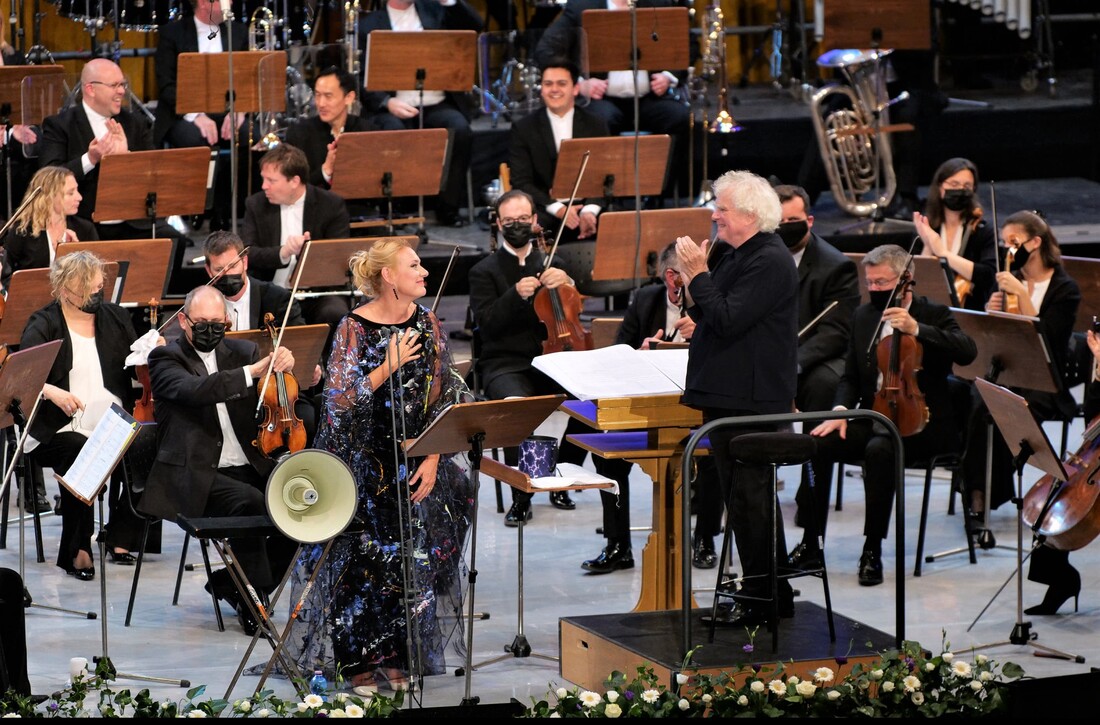|
With the world of music now at our fingertips, and with Europe gradually easing covid restrictions, this month I’ve been attending daily live-streamed concerts at the Berlin Philharmonic Orchestra’s Digital Concert Hall at 6.00am (8.00pm the previous day Berlin time).
From 28 August to 20 September the Digital Concert Hall is streaming many of the performances from the MUSIKFEST BERLIN. Top orchestras, ensembles, conductors and soloists from all over Europe have been performing music from Carlo Gesualdo (16th century) to world premieres, with a focus on Stravinsky to mark the fiftieth anniversary of his death. Really?? He was still very much alive when I was analysing Petrushka at university! The unrelenting ‘modernism’ of some of the music being played over these three weeks, including several late works by Stravinsky, has been intellectually stimulating and thought-provoking, but rarely emotionally stirring. Could it be that many ‘classical’ composers today mistake impenetrability and complexity for originality, or are their aims more about ideas than expression? Did Stravinsky’s early inspirational and charismatic momentum fail him to an extent as his success and celebrity increased? His reputation and enduring popularity would certainly be different without The Firebird, Petrushka and The Rite of Spring (and what an extraordinary performance of that we heard at the festival this morning (14 September) from Les Siècles and Francois-Xavier Roth)! Stravinsky’s agent and biographer, Lillian Libman, describes how she would listen at his studio door at his home in Beverly Hills during his last years as he tinkered on a piano searching for inspiration note-by-note (And Music at the Close, MacMillan 1972). Now, there’s nothing at all wrong with musical complexity but, together with inspiration and genuine expression, it sheds its impenetrability. And there were two new major works performed during MUSIKFEST BERLIN that absolutely stunned me. The first was the festival’s opening concert (28 August 2021) devoted to the world première of Heiner Goebbels’ A House of Call, brilliantly played with commitment and fervour by the Ensemble Modern Orchestra conducted by Vimbayi Kaziboni. A House of Call is an uninterrupted 100-plus minutes “cycle in which the orchestra reacts to voices which the composer has preserved in an imaginary notebook . . . [more]”. For an hour-and-three-quarters I sat glued to this livestream première, sharing that first audience’s unique opportunity. For me, most importantly, it worked as a musical experience, not just an intellectual one. Whatever its background, inspiration or conceptual rationale, it overwhelmed me and drew me in with its own artistic substance. The pre-recorded voices suggested myriad resonances from my own past encounters with history, politics, travel, social and cultural issues, and, of course, music; and the orchestral commentary heightened and intensified those resonances. Perhaps the audience in the hall had programme notes but, so often with modern music, programme notes tell us far more than the music itself; they frequently tell us what the music itself fails to communicate. That it worked without such explanation or ‘excuse’ made the experience all the more momentous. Everything, from the mastery of the conducting and playing to the lighting and orchestral layout, contributed to a truly riveting and memorable experience. The performance started while players were still coming on to the stage, and the coming-and-going of many of the musicians during the performance added to the spontaneity, fluidity and humanity of the music and the music-making. If anything, Czech composer Ondřej Adámek’s orchestral song cycle Where are you? might be described as even more modern in terms of any comparisons with conventional musical language and manners. Premiered six months ago in Munich, this Berlin performance made such an impression that I’ve rarely been more tempted, since the deaths of Stravinsky, Shostakovich and Britten in the 1970s, to label a major new work as a ‘masterpiece’ – I suppose time will tell. And I cannot imagine that any future performers will easily surpass the extraordinary electricity generated by mezzo-soprano Magdalena Kožená with the London Symphony Orchestra conducted by Simon Rattle. Where are you? begins with expressively silent gestures from the singer before any sound, vocal or instrumental, is heard. Then the first sounds are breathy and atmospheric from both singer and players as Human Life emerges, only to begin its quest to understand why?, before creating a god (God) from whom to seek the answer . . . if only (s)he can be found; hence the title. But Life’s voice remains unheard by the God it has created, and finally a megaphone is used to amplify its pleas. The answer, we are told in the festival's programme description, is found in nature, as is made evident in Beethoven’s Pastoral Symphony which followed Adámek’s new work – a nice idea. Magdalena Kožená’s ‘modern art’ dress complemented the music perfectly. What a pity that the orchestra, like most major orchestras, is still tied to the outdated and stultifyingly dull formality of white tie and tails. The presence of the white megaphone on a stand beside the singer was a rather gimmicky distraction for most of the performance as we wondered when and how it would be used. In the event, its use was justified as a visually dramatic adjunct to the texts, which ranged from Czech and Moravian dialects to Spanish, English, Sanskrit and Aramaic. At the end of the performance it was almost disappointing, when the composer came on stage to acknowledge the audience’s enthusiasm, to find that he is just an ordinary-looking and mortal forty-two-year-old. How lucky we are that we can’t have our minds’ images of, say, Bach or Beethoven, as immortalised in idealised portraits and statuary, reduced to mere reality. Ondřej Adámek’s Where are you? has been haunting me now for over a week. But there’s a paradox: while I long to hear and see it again ('see' because no performance is complete without being able to see the opening and closing silent gestures), I’m fearful of being disappointed in trying to repeat a rare and remarkable experience. And, if other new works by Olga Neuwirth, Rebecca Saunders, George Benjamin and others provided opportunities for me to further broaden my experience of today’s living composers, it was Heiner Goebbels and Ondřej Adámek who provided something more deeply moving and genuinely life-affecting.
0 Comments
Leave a Reply. |
AuthorTony Ryan has reviewed Christchurch concerts, opera and music theatre productions and many other theatre performances since the mid 1990s. ReviewsTony has presented live and written radio reviews of numerous concerts, opera and other musical events for RNZ Concert for many years. An archive of these reviews can be found at Radio New Zealand - Upbeat
His reviews of opera, music & straight theatre and numerous reviews of buskers and comedy festival performances are available at Theatreview. An archive of Tony’s chamber music reviews is held at Christopher’s Classics He has also reviewed for The Press (Christchurch). Links to Tony's Press reviews are listed below: 2024 Songs for Helen – Music by Chris Adams 2022 A Barber and Bernstein Double Bill – Toi Toi Opera The Strangest of Angels – NZOpera Will King (Baritone) and David Codd (Piano) – Christopher's Classics 2019 Ars Acustica – Free Theatre Truly Madly Baroque – Red Priest The Mousetrap – Lunchbox Theatre Iconoclasts – cLoud Last Night of the Proms – CSO 2018 An Evening with Simon O’Neill NZSO Catch Me If You Can – Blackboard Theatre Brothers in Arms – CSO Fear and Courage – CSO Sin City – CSO Don Giovanni – Narropera at Lansdowne Mad Hatter’s Tea Party – Funatorium Weave – NZTrio Tosca – NZ Opera 2017 Sister Act – Showbiz Broadway to West End – Theatre Royal Chicago – Court Theatre Tchaikovsky Symphony No. 5 – CSO Homage – CSO Last Night of the Proms – CSO SOAR – NZTrio Pianomania – NZSO Rogers & Hammerstein – Showbiz Songs for Nobodies – Ali Harper The Beauty of Baroque – CSO Travels in Italy – NZSO Archives
February 2024
Categories |


 RSS Feed
RSS Feed
